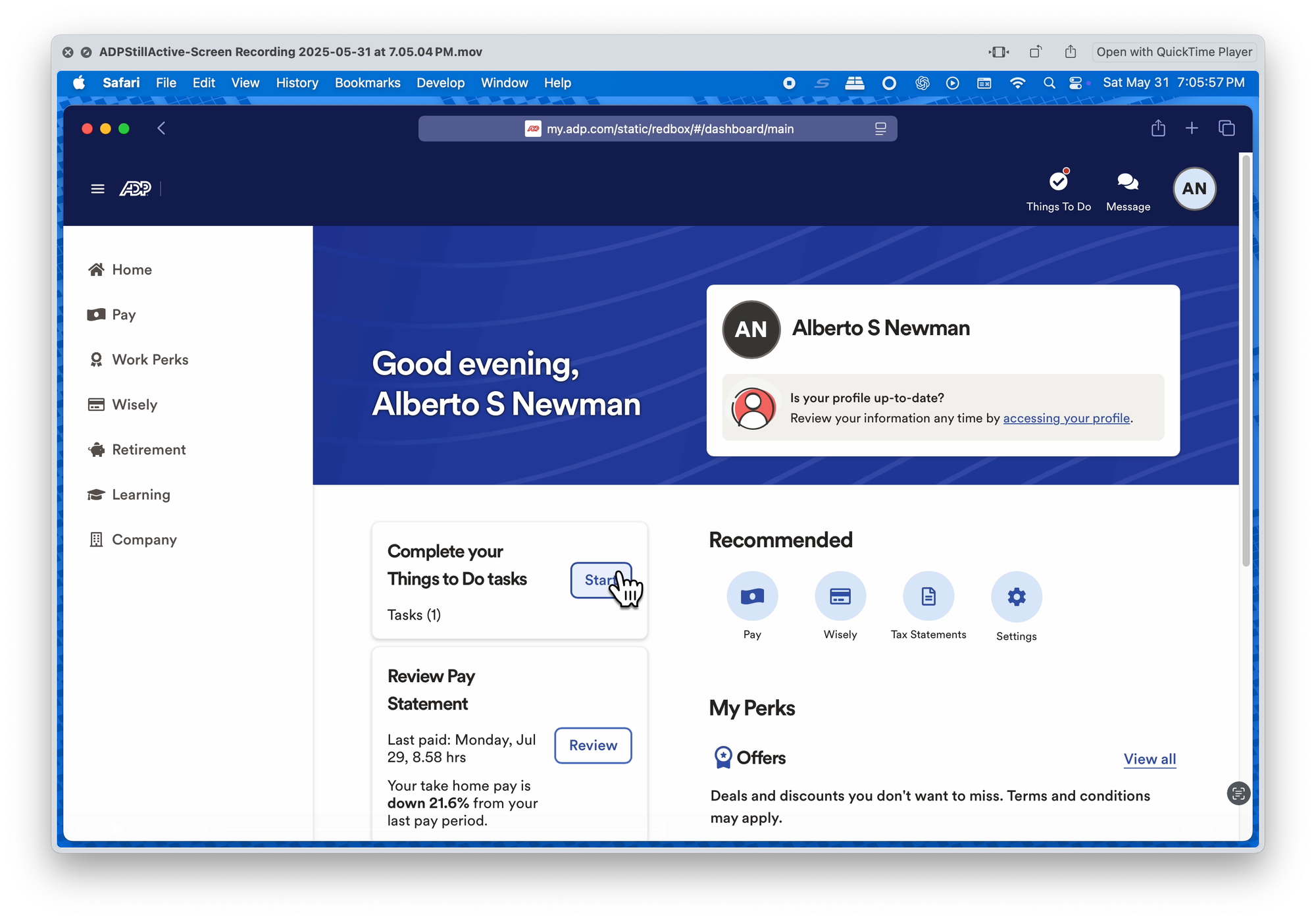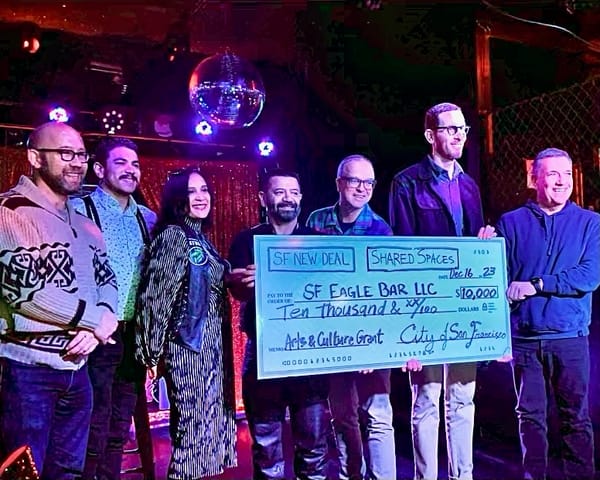1. Let Me Work: Fighting to Reclaim My Job and Community at SF Eagle

This is a 7-part account of what happened to me — and to others who were directly affected.
It’s based on what we experienced, what we witnessed, and what we remember. When I describe what someone else did, I’m doing so honestly and carefully. I have documentation and support from others for the key parts. I’m not trying to harm anyone — I’m telling the truth about the harm we lived through.
I’ve tried every internal route I had respectfully, prompty, and directly. I’ve contacted management, asked for a meeting, followed up, and waited in person. At this point, I have no other form of accountability. No process has been offered. No one has stepped in to review what happened. Speaking publicly isn’t my first choice—it’s my only remaining option.
My name is Alberto Newman. I'm 32, Mexican, male, and gay. The SF Eagle is not just my place of employment. It was where I built my community and even held my partner’s memorial. Now, I no longer feel safe going there alone because of one manager out to make sure I never retuen.
I no longer feel safe going to SF Eagle alone. My presence was recently used as justification to remove me from one role, which quickly escalated to all my roles and eventually cut me off completely from staff and owner communications. SF Eagle is my only job, my livelihood, and the community space I relied on. Randy Maupin, the manager involved, also holds positions at other prominent venues in San Francisco
I’ve returned a few times to try to talk to the owner, but not yet to reconnect with my community, something I’ve deeply needed since my partner passed away. Uncertain about when Randy works, I’m worried even a casual interaction might be twisted into a reason to ban me from a space that’s not just personally significant, but historically crucial to the LGBTQ and leather communities.
After a confusing email on May 21, 2025, seemingly from the owner’s address—but inconsistent with previous communications—it’s clear that it’s not just my job at risk, but the SF Eagle itself could now be at risk, potentially undoing everything the community has built.
This isn’t just about my own experience; it reflects a wider pattern affecting others who’ve so far remained quiet or felt discouraged from speaking out. It’s about accountability, fairness, and protecting spaces built by and for marginalized communities.
I’ve lived my whole life in San Francisco. I was born on Geary Blvd., my ride home in grade school was the 44 bus, went to high school on 24th Avenue, found my community on Castro Street, got my degree across the bridge on Shellmound Street, met my late partner on Folsom Street, and by surprise found my career on the southwest corner of 12th and Harrison.
I started at SF Eagle because I was there all the time anyway. One night a supervisor casually asked if I had ever considered barbacking. I had no experience but needed work—my unemployment from Covid had ended months before. I said sure, why not?
My first shift was a Thursday in November 2021, training under Bretchen Towers. She immediately made me feel welcome and told management while we were closing one night “This one… is going to be great for this bar, use him.” Soon, I was juggling three roles: Barback, Sound Tech for Thursday Night Live, and Technical Manager—a job created specifically around my abilities. People regularly told me I was one of the hardest workers there.
My usual hangout quickly became a place where my work was valued. I could use my skills and spend time with people I cared about, and now I was getting paid for it.
This past year changed everything. My partner died in December 2023. When I returned from medical leave in March 2025, Randy Maupin—who joined after I did and quickly moved from bartender to management—became openly hostile. Conversations about our work on a project we co-founded became tense and personal. He claimed my absence had directly impacted his mental health, saying just my presence would negatively affect the team.
There was no clear discussion or resolution. Instead, he quietly removed me from our shared Instagram, blocked my account, and erased my contributions entirely. Since then, his hostility has escalated and feels increasingly out of control. Each week brings new confusion and frustration, highlighting management’s ongoing pattern of silence and avoidance. My attempts to reach out have only resulted in a private reply from Randy, without anyone else copied, despite my original message being sent to the entire staff.
Now, I’m being treated like I don’t belong in the same place that once felt like home. The place that supported me when I needed it, that gave me community when I was alone. I put in work, helped build something meaningful. Not just for myself, but for everyone I’ve crossed paths with in the last decade of my gay life here. Now, I’ve been blocked and told I was never a part of it from the start, my contributions erased.
Visiting the bar in person hasn’t helped either. Coworkers remain confused, management is unreachable, and the owner, Lex Montiel, is absent. Lex once messaged me that Randy was “acting stupidly, he is out of control,” but nothing changed afterward.
I messaged Lex on May 21 for a meeting. That afternoon, I received an email that immediately raised red flags:
Alberto,
This is to advise that you will not be offered a position with the SF Eagle Bar.
The vague language complicated my income verification. The lack of CCs was unusual, and crucially, the message contradicted my payroll records. Whether falsified or not, this manager’s actions now pose serious legal risks, threatening SF Eagle’s Legacy Business and Historic Landmark status.
Unfortunately, this isn’t the first troubling incident involving Randy. A previous incident of transphobic behavior went largely ignored. As the only manager present at the bar, Randy’s actions have been allowed to go unchecked and unchallenged. His behavior has been quietly excused or overlooked, reinforcing harmful patterns and further marginalizing those affected. It’s eroded trust, not just in him, but in the space as a whole.
I’ve repeatedly tried to resolve this internally, but have had no further response from the owner.
I currently don’t have legal representation. Hearing my late partner recall his battle with workplace issues, also involving a major pillar in our community, taught me legal disputes often end quietly, with settlements and silence rather than real accountability. He never got to tell his story, but the weight of what he went through never left him—not even in his last years.
My experiences at SF Eagle—having my disabilities and mental health weaponized against me, facing hostility after medical leave—aren’t isolated. They’re part of a troubling pattern of inflexibility, dismissal, and disregard. Silence has allowed these problems to continue unnoticed, under the guise of protecting someone else’s mental health while disregarding ours. These stories need to be shared, and real change needs to happen—not just at SF Eagle, but anywhere unchecked authority allows discrimination to quietly thrive.
It’s worth noting that Randy also holds positions at other prominent venues. For me, the SF Eagle was my only job, my livelihood, and the community space I relied on.
If this resonates with you, please reach out. This isn’t just my story; it’s part of a larger narrative that’s been hidden until now.


This is based on my experience, and on what others who were directly affected went through. Everything here reflects how we saw things happen. When I talk about what someone else did, I’m being honest and careful, sharing what I witnessed or was told. I have documentation and support from others for the key parts of this. I’m not trying to cause harm — I’m telling the truth about harm that happened to me, and to others.
Supporting documents are available upon request.


